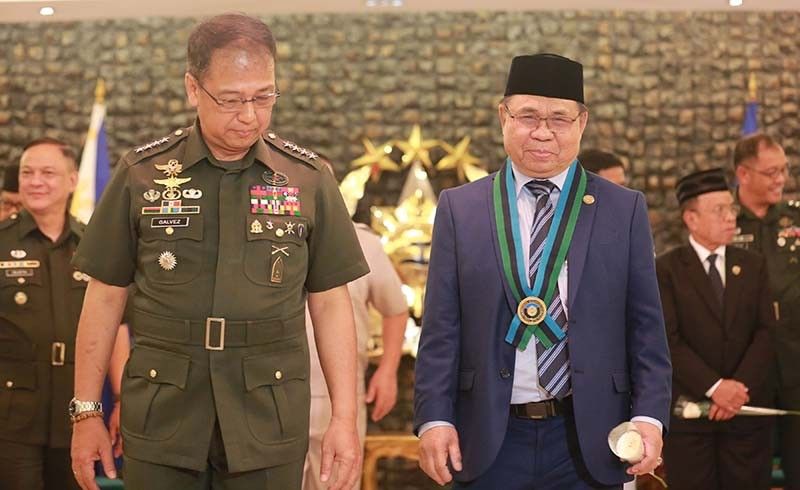MILF chairman makes historic visit to Camp Aguinaldo

MANILA, Philippines — Moro Islamic Liberation Front Chairman Al Haj Murad Ebrahim was nostalgic and expressed happiness at setting his foot in Camp Aguinaldo, the headquarters of the Armed Forces of the Philippines that for decades was the rebel group's fierce adversary.
Ebrahim arrived at the headquarters of Camp Aguinaldo with Bangsamoro Transiiton Commission Chairman Ghazali Jaafar and other ranking MILF leaders on the invitation of Gen. Carlito Galvez Jr., Armed Forces chief of staff.
The visit, Galvez said, was a gesture of reciprocity. The AFP chief had visited the MILF's Camp Darapanan in Sultan Kudarat last month, where he was honored as the first military chief welcomed to the group's main camp.
Ebrahim and his party were led by Galvez to the Balangiga Hall in the main headquarters, where he was given different mementos and tokens as a gesture of the AFP's gratitude for the visit.
The MILF chairman and members of the BTC later sat in a closed-door conference with Galvez and other ranking military officials.
"Well, it's both happiness and sentiment. As what I have said, I never thought I will be walking around this camp," Ebrahim told media right after a press briefing with Galvez.
The MILF chairman also visited Malacañan Palace in 2014 when he witnessed the signing of the Comprehensive Agreement on the Bangsamoro, the peace deal between the government and the MILF.
'Now, we are here'
Ebrahim admitted that during the height of their revolution, their focus was to destroy the camps of the Armed Forces of the Philippines. “But now, we are here.”
He said his sentiment against the military started in 1969, when he was 19 years old.
Ebrahim was a student at Mindanao State University and later transferred to Notre Dame College, both in Central Mindanao.
He said that what led him and others to join the revolution was the series of massacres at the time.
"We felt there was a genocidal campaign against the Moro people. So we were forced to organize ourselves to defend," Ebrahim said.
He said that they had generally been on defensive mode until the attacks against the Moro people worsened after martial law was declared in 1972.
"So many Moros were killed, so we organized already a liberation organization – thus the birth of the Moro National Liberation Front," Ebrahim said.
The MILF split from the MNLF in 1977.
'Final stage of Moro struggle'
The MILF chairman said that walking towards the Philippine military's headquarters and shaking hands with its commanders and officers made him think about the pending plebiscite on the Bangsamoro Organic Law, the law that will imlplement the 2014 peace deal by creating a new region to replace the Autonomous Region in Muslim Mindanao.
"I thought this is a signal from Allah that it's already the final stage of our struggle," Ebrahim said.
"I do not remember anyone in the MILF hierarchy—except for Ghadzali Jaafar, who visited last July as chairman of BTC—who has been to Aguinaldo," Ebrahim said.
Galvez said Ebrahim’s visit was his way of reciprocating his visit to Darapan, where arrival honors stretched five kilometers.
"That was the longest foyer honors that I have received from any camp," Galvez said.
He said the visits done by the AFP and MILF leadership manifest their strongest cooperation towards justice and lasting peace for the Bangsamoro region.
Galvez assured Ebrahim that, while the AFP will soon change leadership when he retires, it will continue to support the peace process with the MILF.
"I will always said that for the rest of my life I will always dedicate my services for the peaceful resolution of our place, particularly the Bangsamoro," Galvez, who has said he will campaign for the ratification of the BOL when he retires, said.
Galvez was commander of the 6th Infantry Division and later of the Western Mindanao Command before being appointed AFP chief of staff in April.
He was chairman of the government panel of the Coordinating Committee on the Cessation of Hostilities and helped "negotiate a ceasefire, separate the two contending forces, assist in the evacuation of casualties, assess the situation of internally displaced persons, and help stabilize the situation" after the Mamasapano clash in 2015.
- Latest
- Trending



























